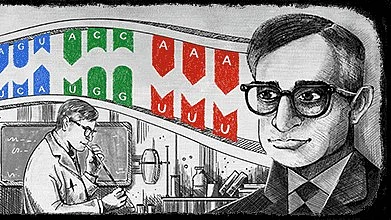The Google Doodle on 9 January, Tuesday featured Har Gobind Khorana, the man behind the construction of the first synthetic gene. Known for extensive research on DNA, the Indian origin biochemist was honoured by the most popular search engine on his 96th birthday.
Dr Khorana, shared the 1968 Nobel Prize in Physiology or Medicine with Robert W Holley and Marshall W Nirenberg "for their interpretation of the genetic code and its function in protein synthesis." Their work unraveled a key mystery surrounding genetic codes that information stored in DNA is important for determining the types of proteins that cells create.
One of the most respected scientists in the field of molecular Biology was once the only literate person in his small village of 100 people in Punjab. Dr Khorana, the youngest kid among five, was born on 9 January, 1922 in a remote village in Raipur district of Punjab, which is now in Pakistan.
Always driven by his passion for science, Dr Khorana competed his graduation and masters from the Punjab University and was given a fellowship by the Indian government in 1945 to pursue further doctoral studies at the University of Liverpool.
Dr Khorana further travelled to Switzerland and Canada before landing at the University of Wisconsin in 1960, where his research won him the Nobel prize.
Another Nobel laureate Dr Venkatraman Ramakrishnan is a huge fan of Dr Khorana’s work. In 2011, Dr Ramakrishnan told Rediff , "The genetic code, which Dr Khorana helped establish, is a foundation of modern molecular biology, which would be unthinkable without it."
The renowned academic then joined as a faculty at Massachusetts Institute of Technology in 1970. Two years later, Dr Khorana constructed the first artificial synthetic gene, he later announced that he had gotten an artificial gene to function within a bacterial cell.
Other than the Nobel, Dr Khorana was also honoured with the Lasker Award for basic medical research and the National Medal of Science.
The Washington Post noted that Khorana chose to address important scientific announcements in scientific publications, without routing it through the media. “When he spoke out, it was against declines in scientific funding by the government and against the Vietnam War and the US invasion of Iraq in 2003,” the newspaper wrote.
Har Gobind Khorana left a legacy for the entire scientific realm, but went through major traumas in his personal life. He lost his daughter in 1979 and his wife in 2001.
As per a rediff report, the University of Wisconsin honoured him by naming a hall after him, there’s also a park in Vancouver and US-India student exchange program named after Dr Khorana.
(At The Quint, we question everything. Play an active role in shaping our journalism by becoming a member today.)
